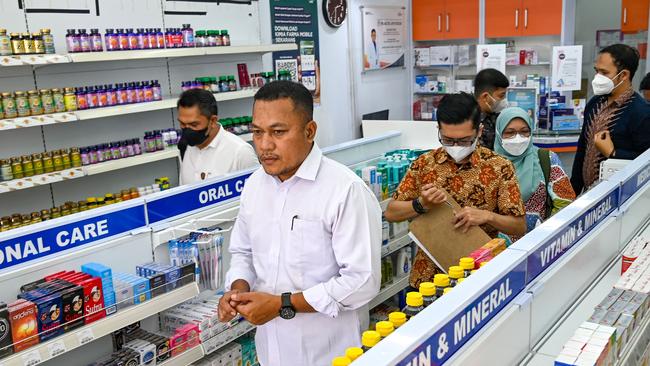Indonesia’s despair as child death toll mounts
Of 255 children, almost all of them under the age of six, admitted to hospitals across Indonesia with acute kidney injury since late July, 143 have died.

For months, paediatricians at Jakarta’s Cipto Mangunkusumo Hospital battled furiously to save the lives of dozens of young children ferried through their doors with symptoms of severe kidney infection, only to find nothing they were doing could stop their rapid deterioration and death.
“They would come to the hospital conscious, but within five days of care … we tried everything. We gave them antibiotics and antibodies, but they continued to worsen and lost consciousness,” said Eka Laksmi Hidayati, a paediatrician and kidney expert at one of the country’s main referral hospital. “All the patients who came in September died.”
Of 255 children, almost all of them under the age of six, admitted to hospitals across Indonesia with acute kidney injury since late July, 143 have died – a death rate of 56 per cent.
Most of them had fallen ill with flu-like symptoms though by the time they reached hospital they were unable to urinate and were seriously ill. Working on the assumption they were suffering from post-Covid multi-system inflammatory syndrome (MIS-C), a condition in which different body parts become inflamed, doctors were administering medications for MIS-C but seeing no improvement. Many patients were also given dialysis, to no avail.
In government labs across the country, pathology tests of samples taken from the children were coming up negative for exposure to viruses, bacteria and parasites.
It took more than two months for it to dawn that the diagnosis was wrong and that the cause was poisoning from contaminated medicines and only then thanks to an October 5 alert from the World Health Organisation related to a similar crisis in The Gambia.
Some independent experts have said it should have been the first avenue of investigation, and that the crisis has underscored the long road ahead to improve Indonesia’s underfunded health system.
The WHO alert linked the deaths of 70 children in the West African nation – around the same time as those in Indonesia – to unacceptable levels of ethylene glycol (EG) and diethylene glycol (DEG) in four paracetamol syrups produced in India.
Indonesian authorities began conducting toxicology tests which turned up similarly high levels of the compounds, which are banned for use in Indonesian medicines and often used in industrial products such as pesticides, brake fluids and anti-freeze.
Last week, the country’s health ministry banned the sale of all medical syrups across the country (156 have now been deemed safe to use) while the Food and Drug Monitoring Agency (BPOM) recalled five products found to have levels of EG and DEG above safe thresholds.
Late on Monday the BPOM said it was considering a criminal investigation into two companies found to have produced medicines with unsafe levels of EG and DEG. Authorities believe the most likely cause of poisoning was through “residue contaminants” of EG and DE, which can build up to dangerous levels through a lack of quality control in the use of non-hazardous liquids commonly used to make syrup medicines more soluble.
But Indonesian and Indian authorities are yet to reveal the source of the contamination; whether it occurred at a local level or could be traced back to a batch of raw ingredients potentially imported from further afield, thus posing a potentially wider threat.
Indonesian Health Minister Budi Gunadi Sadikin said there had been a steep decline in new patients presenting with acute, progressive kidney failure since the October 18 ban on syrup drugs, and children now being treated with Fomezipole – a rare antidote for chemical poisoning – are improving in 10 out of 11 cases.
“We have received 20 vials (of Fomezipole) from Singapore, 16 from Australia and we are in the process of buying from the US and Japan,” Mr Sadikin said.
Dr Eka told The Australian her hospital had seen no new cases for five days, after almost three months in which they were admitting “at least one new patient every two days … but reports from other cities are still increasing”.
But that is cold comfort to the many families whose children have died. The Indonesian Legal Aid Foundation has accused the government of being too slow to respond to the unfolding crisis, and the drugs regulator BPOM of “weak oversight”.
The country’s ombudsman said the BPOM had allowed pharmaceutical companies to independently test “with no meaningful control”.
BPOM chief Penny Lukito has defended her agency, saying it is the responsibility of the producers to conduct their own analysis of raw materials they buy.
Dr Lukito said the BPOM had followed all domestic and international regulations for testing, but that there was “no standard for EG and DEG as a reference for conducting surveillance because this is actually prohibited”.



To join the conversation, please log in. Don't have an account? Register
Join the conversation, you are commenting as Logout